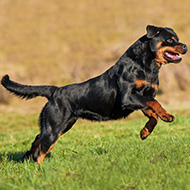Rottweilers 'most at risk of cranial cruciate ligament rupture'

Researchers identified Rottweilers at most risk of developing cranial cruciate ligament rupture.
Rottweilers are most at risk of developing cranial cruciate ligament (CCL) rupture, according to new research.
The study by the Royal Veterinary College (RVC) also describes the factors influencing how CCL rupture is clinically managed and identifies other breeds that are most at risk, including the bichon frise and the West Highland white terrier.
Researchers hope their findings, published in The Vet Journal, will help owners and vets identify dogs most at risk of CCL rupture. The paper also highlights the clinical reasons used in first-opinion veterinary practice to decide between surgery or not for the injury.
Associate professor in companion animal epidemiology and co-author of the paper, Dr Dan O’Neill, said: “After centuries of reshaping by mankind, dogs now come in over 800 distinct and recognisable breeds that each has its own unique pattern of health and disease. This new study helps owners of breeds such as rottweiler, bichon frise and West Highland white terrier to understand that sudden lameness in a hindleg could indicate a ruptured cruciate ligament that needs urgent veterinary care.”
Cranial cruciate ligament rupture is a serious and common problem for dogs, with most cases characterised by the gradual degeneration of the cruciate ligament. This degeneration can lead to sudden onset pain and lameness.
Led by the RVC’s VetCompass Programme, the study involved 1,000 CCL rupture cases and a random selection of 500,000 other dogs without CCL injury.
Breeds identified by the team at the highest risk of developing CCL rupture were the Rottweiler (x 3.66 times risk), bichon frise (x 2.09), West Highland white terrier (x 1.80) and golden retriever (x 1.69). In contrast, the breeds identified by the study at least risk of developing the disease were the cockapoo (x 0.26), chihuahua (x 0.31), shih-tzu (x 0.41) and German shepherd dog (x 0.43).
The study also found that insured dogs and dogs weighing over 20kg were more likely to receive surgical management. Dogs older than nine years and those with another major clinical problem at the time of diagnosis with CCL rupture were less likely to receive surgical management.
VetCompass PhD student at the RVC and lead author of the paper, Camilla Pegram, said: “This study has used the power of “big data” to robustly address the risk factors for cruciate ligament rupture diagnosis and management in dogs. The factors affecting the decision to surgically or non-surgically treat dogs with cruciate rupture are now clearer, with future work underway to address the clinical outcomes of this decision.”
Small animal surgery lecturer and co-author of the paper, Dr Anna Frykfors von Hekkel, added: “This study helps to confirm suspicions we have held in the clinic, with recognition of breeds such as the West Highland White Terrier and Rottweiler being at increased risk of developing CCL disease.
"It offers a valuable insight into how these patients are managed in general practice and factors that might influence that challenging decision.”



 The Veterinary Medicines Directorate (VMD) is inviting applications from veterinary students to attend a one-week extramural studies (EMS) placement in July 2026.
The Veterinary Medicines Directorate (VMD) is inviting applications from veterinary students to attend a one-week extramural studies (EMS) placement in July 2026.